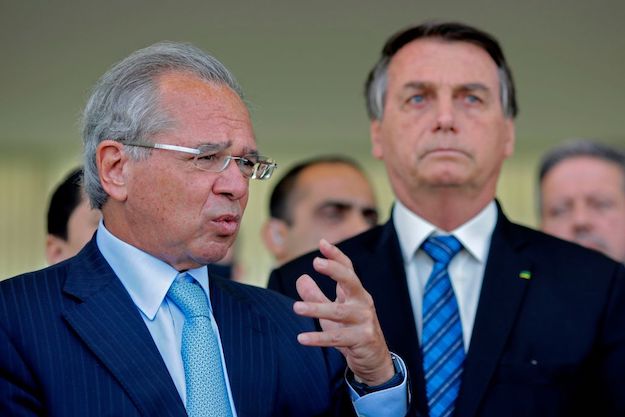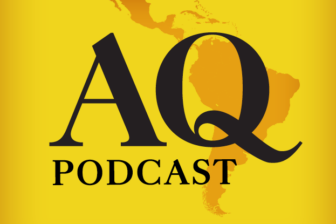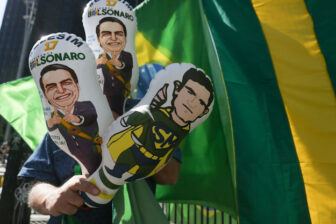RIO DE JANEIRO – During the initial weeks of the COVID-19 pandemic, Brazil’s Congress was trying to figure out how to provide support to millions of suddenly unemployed families. President Jair Bolsonaro’s government had proposed an Auxílio Emergencial, an “Emergency Aid” payment, of 200 reais (around $37) per month for those affected, with a projected three-month duration for the program. Some in the opposition defended an auxílio of 1000 reais per month.
On the decisive night of the voting, March 25, the House of Deputies’ majority leader Vitor Hugo telephoned Bolsonaro, who was in a meeting with Finance Minister Paulo Guedes. “We’re going to lose,” Hugo said. “Congress will approve an auxílio of 500 reais.” It would have been a major defeat for Bolsonaro. For political purposes, the opposition would come out as the good guys while the president would be Ebenezer Scrooge – the evildoer with no social sensitivity during an unprecedented crisis.
The call was on speakerphone, so Bolsonaro turned to Guedes: “What if we offer 600 reais?” Guedes was surprised. That was equivalent to about $115, and was twice the amount his staff had seen as the upper limit in negotiations. But Guedes understood this was politically crucial. So he agreed. “It was a take it or leave it situation,” Guedes told a group of investors in September, recounting the story above. In less than a minute of conversation and without further analysis, Guedes placed himself in a dilemma he still doesn’t seem to know how to solve.
Auxílio Emergencial became the Bolsonaro administration’s greatest success. It helped prevent some 66 million beneficiaries from falling into poverty. In the northeast, the poorest region in the country and where Bolsonaro lost in the 2018 election, the average income actually grew compared to before the pandemic. The money given to millions returned to the economy at large, helping make the recession less harmful than expected. In June the IMF predicted a 9.1% drop in Brazil’s GDP. Today banks project a decline range between 4.1% and 4.9% – a horrible result, but still less catastrophic than any other major economy in Latin America.
At the same time, Auxiíio Emergencial transformed the social support base for the president. Attacked by the media and scientists for saying that COVID-19 was “a little flu,” Bolsonaro lost much of his support among the wealthy and the middle classes in big cities like São Paulo and Rio. At the same time, he got enthusiastic applause among those whom he helped. In June his personal approval went over 50%, and today it is still about 45%, according to polls by PoderData.
But as Milton Friedman – one of Paulo Guedes’ masters at the University of Chicago – famously said: “There is no free lunch.” Instead of lasting three months as planned, Auxílio Emergencial still continues. Though the benefit has since been cut to 300 reais a month, it has still already cost the Brazilian Treasury more than $60 billion. It’s one of the most generous social programs on the planet and, some say, too expensive for a poor country like Brazil. Given this and other stimulus initiatives, this year’s fiscal deficit is expected to exceed $169 billion – or about 12% of GDP. In the most optimistic forecasts, Brazil will not have a budget surplus again until 2026.
Meanwhile, suspicious of the Brazilian government’s ability to continue paying its debts, markets are demanding record premiums on Brazilian bonds. In a risky move, Brazil’s central bank has reduced drastically the term of these bonds. So much so that in the first four months of 2021, the Brazilian treasury will have to pay $120 billion in maturities.
There is an irony that Guedes, of all people, is under market suspicion. A lone voice in defense of liberal economy in Brazil for decades, Guedes became a millionaire in the 1990s as a trader and an investment bank partner. He was the one that convinced business leaders to support Bolsonaro in the 2018 election, stating that his interventionist speeches were buried in the past.
So what happens now? Will Guedes try to reduce the program further, or cut it entirely? It’s tough to say, but the recent past gives us some hints.
In 2018, I wrote a book called O Pior Emprego do Mundo (The Worst Job in the World) about Brazilian finance ministers. All of the 14 predecessors of Guedes I spoke with mentioned the delicacy of the relationship between economic policymakers and the president. Brazil’s economy has a history of highs and lows, so the finance minister generally is a primus inter paris, a first among equals, in the cabinet. But the power isn’t his – it’s delegated from the president. So, you should never believe when someone in Brazil is called a superministro. He still can be dismissed at any time.
The second lesson former policymakers taught me was that finance ministers deal with a huge range of responsibilities – unemployment, inflation, fiscal credibility, currency and so on – while the president, regardless of his or her political persuasion, worries only about one thing: popularity.
The book came out before Bolsonaro and Guedes came into power, but it works as a manual. The press quickly called Guedes a superministro, and he was a market darling when he promised to reform Brazil’s large state, cut public servant privileges, privatize and create a friendly environment for business. Almost two years later, he has not only failed to sell state-owned enterprises, but saw the military create a new one to manage naval ships. After passing the pension reform in Congress, a process started by the previous administration, Guedes has so far failed to get any new reform approved, partly because of his tough relationship with Congress. Brazil’s economy was struggling with lower than expected growth even before the pandemic.
Pressure on Guedes will grow in coming weeks as Congress comes back to work after the municipal elections. Worried about maintaining his popularity, Bolsonaro wants to replace Auxílio Emergencial with a new program, costing around $10 billion a year. But there is no space in the budget to create it without reducing other social benefits. Bolsonaro vetoed such cuts, saying: “I’m not going to take from the poor to give the poorest.” So Guedes’ team came up with a proposal for re-routing federal money that one senator said was tantamount to a default and broke budget rules. This upset the market further and caused volatility in the local currency.
There is no easy way out. To Bolsonaro, Guedes is the guy who will convince markets that they have to swallow some big spending so he can beat the leftist opposition and be reelected in 2022. To the markets, he is the guy who should control Bolsonaro’s populist impulses. Of one thing, there can be no doubt: Being finance minister of Brazil really is the worst job in the world.
__
Traumann is a journalist and independent consultant









